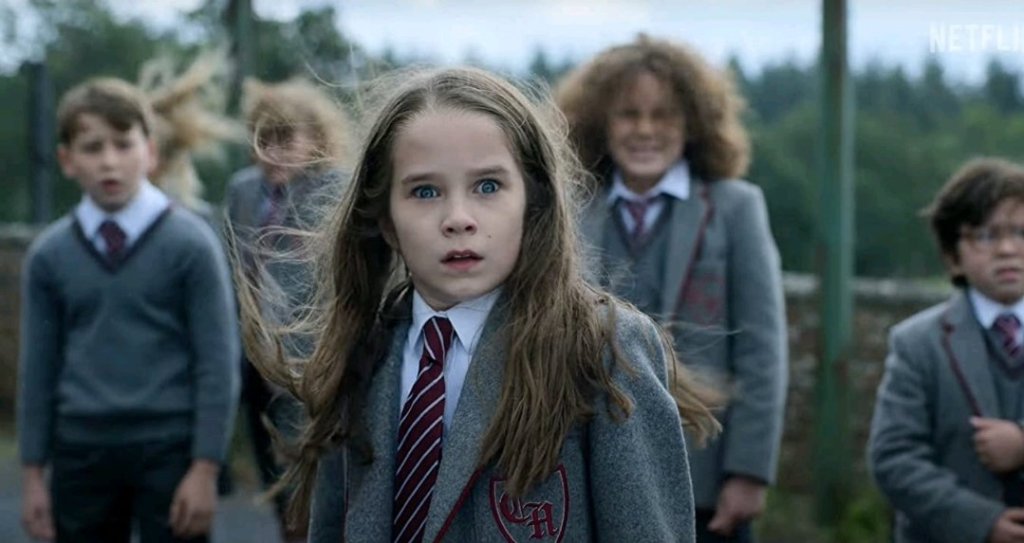Based on the musical stage adaptation, Matilda follows the lead character as she’s ignored at home and bullied at school. When her teacher Miss Honey notices her gifts, things begin to change.
Movie musicals adapted from the stage generally go one of two ways. It’s either too stagey and it doesn’t work for the big screen or it’s utterly brilliant. This falls firmly in the latter camp with outstanding songs, dance numbers and performances by the principle cast as well as the ensemble of children.

A new cast taking on Matilda is a daunting prospect, especially when the 90s film is as beloved as the stage show. However with the likes of composer Tim Minchin and musical theatre director Matthew Warchus on-board (both of whom worked on the stage show) it’s already on firm footing. Alisha Weir takes on the lead role and commands the screen with her charming presence which can be felt particularly when she’s performing some of the key songs. However her emotional chops deserve a mention too as she shows an impressive range. Playing Matilda takes a balance of personas as she is burdened with awful parents, a terrifying head mistress whilst at the some time allowing herself to escape with storytelling.
The film follows her as she navigates her way through school and her home life with her parents Mr. and Mrs. Wordwood who are played by Andrea Risborough and the scenery chewing Stephen Graham who dons some interesting teeth for his role. Whilst Risborough is fantastic with what she is given, it’s Graham who is ine of the film’s standouts as he’s clearly having an amazing time using his superb comedy skills which are rarely seen these days. He performs brilliantly as the horrible dad who couldn’t care less about his daughter. In complete contrast Lashana Lynch goes against type to portray Miss Honey, a mild mannered, well-meaning and caring person. It’s not something we’ve seen from Lynch who has recently played a spy, warrior and a superhero. It’s an impressive feat which Lynch has pulled off, whose distinct singing voice gives When I Grow Up and My House particular resonance.

Whilst on the surface this just looks like a fun musical, it’s much deeper and deals with the issues Matilda faces on a daily basis. Neglective and abusive parents, a bully at school and for a long part of her life not having her talents recognised. What adds to Matilda’s trauma is the use of colour, a cheap pastel and gold pastiche covers most of her home but her room and school both have a prison aesthetic to them, creating daunting areas where she spends a lot of time. She has managed to create her own escapism and becomes a storyteller herself. She shares her imagination with librarian Mrs. Phelps played by the charming Sindhu Vee who has become encapsulated by Matilda’s creative mind. Vee portrays a wonderfully curious adult who just wants to know more. Along with Miss Honey, Matilda at least has these two encouraging figures in her life, people who understand her plight as an outsider. Unlike Emma Thompson’s Miss Trunchbull who portrays this great villain as a pantomimed version but in the context of this film it works. Her booming presence makes her larger than life, an attribute we come to expect from such a character. Thompson is a driving force of this film, as she plays a note perfect Trunchbull.

Matilda the Musical has a limited cinema release with Netflix striking a deal to launch it into theatres for just a week. It begs the question what are they hoping for? What will bring people to come and see it rather than wait for its December Netflix release? What will bring people to see it are the songs. School Song, When I Grow Up and Revolting Children are particular standouts which the ensemble cast performs in glorious choreographed dance sequences. At times it performs like a staged play without being stagey thanks to the number of sets the film explores from the school, people’s homes, outdoors and more.
Wildly entertaining with buckets of fun, great songs and a superb cast, Matilda the Musical is a masterclass in how to adapt a stage show to film.
5 out of 5.
Keep. It. Reel.
